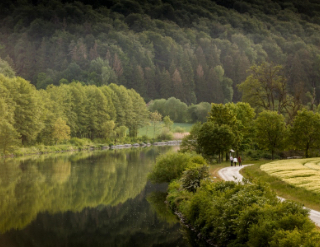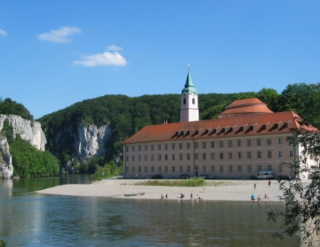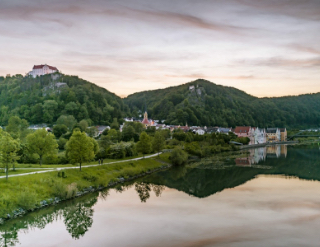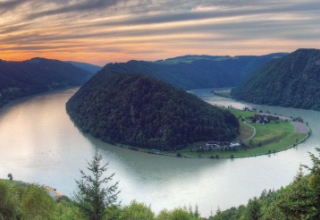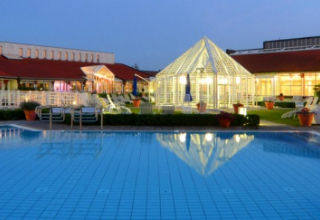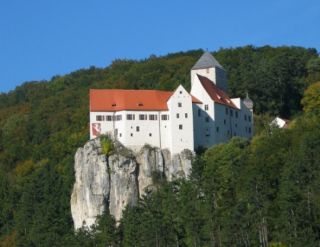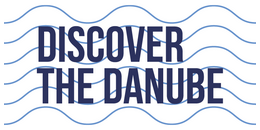Quisque fermentum tincidunt sodales. In fermentum pharetra mattis. Duis id auctor tellus, et rutrum neque. Aliquam sit amet vehicula leo. In gravida eros et turpis viverra semper. Interdum et malesuada fames ac ante ipsum primis in faucibus.
It covers an area of more than 350 thousand square kilometres, divided into 16 states, inhabited by 81.8 million people. Berlin is the capital of Germany, which is a member of European Union and all the major political, economical and military alliances.
Germany is one of the most developed countries in the world, and a country with a significant international influence. It is also an innovative centre of knowledge, learning, culture and modern art movement. Most of German cities are tourist attractions, thanks to their rich history and remarkable architecture.
Natural landscape diverses from the Alpine foothillsin the South, to the central highlands and North German plain.
The Danube rises in South-western Germany, in the Black Forest (Schwarzwald), and runs through the country for 647 kilometres. Important historical cities, beautiful landscapes and developed infrastructure, are characteristic of the Danube banks in Germany.
The Danube in figures
There are around 90 towns and cities, both large and small, along the Danube
Cities (population of more than 100,000) on the Danube: Ulm, Regensburg
Hotels and accommodation
A wide-ranging selection. From holiday apartments, inns and guesthouses to first-class hotels.
Info:
www.germany.travel
www.dehoga.de
Bird species on the Danube
More than 300.
The Danube is one of the most important bird migration routes in Europe and the unspoilt countryside around the river often provides an important place for overwintering, roosting and breeding, including for rare species
National parks/nature conservation areas
Nature reserves: Southern Black Forest, Upper Danube, Augsburg-Westliche Wälder, Altmühl Valley, Bavarian Forest
Biosphere reserves: Swabian Alb
National parks: Bavarian Forest
Along with countless areas of outstanding natural beauty and nature conservation areas
Entry requirements
To enter Germany you need a passport that is valid for at least four months from your date of arrival. For citizens of EU countries a valid identity card is sufficient.
http://www.auswaertiges-amt.de/DE/EinreiseUndAufenthalt/Uebersicht_node.html
Contact
German Foreign Office
Switchboard: (24-hour service): +49 (0)3018 170
Local services: (Mon-Fri, 9am to 3pm) +49 (0)3018 172 000
Fax: +49 (0)3018 173 402
Postal address:
German Foreign Office
11013 Berlin
Germany
Visas
EU nationals do not require a visa. Citizens of all other countries will generally need a visa, with the exception of some countries for which the European Union has abolished the visa requirement. Nationals of those countries do not require a visa for visits to Germany lasting no longer than three months in a six-month period.
Arrival by
Plane
The Danube region is easily accessible by air. The international airports in Stuttgart and Munich are nearby and there are connecting services from Frankfurt/Main and Nuremberg airports.
www.flughafen-stuttgart.de
www.flughafen-muenchen.de
www.frankfurt-airport.de
www.flughafen-nuernberg.de
Coach
Eurolines (www.eurolines.com) offers convenient coach travel to Germany from the following countries:
Bosnia and Herzegovina, Bulgaria, Croatia, Macedonia, Moldavia, Austria, Romania, Serbia, Slovakia, Slovenia, Czech Republic, Ukraine and Hungary.
Since January 2013, a number of long-distance coach operators have been offering daily or regular services between major German towns and cities. Virtually every major town in Germany has its own bus station.
Car
Germany has an excellent road infrastructure, making it easy and convenient to travel around the country by car. The autobahns in the Danube region are part of a well connected network, ensuring a stress-free journey to your chosen holiday destination.
The following stretches of motorway run alongside the Danube:
A3 (Regensburg, Passau), A7 (Ulm), A8 (Ulm), A81 (Donaueschingen), A9 (Ingolstadt)
www.adac.de
Rail
There are regular InterCityExpress and international services to the region’s main train stations in Ingolstadt, Munich, Nuremberg, Passau, Stuttgart and Ulm. From here, you can easily travel to your chosen destination by public transport, hire car or taxi.
Deutsche Bahn is your expert partner for all rail travel.
www.db.de
Boat
The Danube has a number of international shipping ports along its course. Key transshipment ports within Germany include Nuremberg, Kelheim, Regensburg, Straubing-Sand, Deggendorf and Passau. The non-navigable upper reaches of the Danube between Donaueschingen and Kelheim are ideal for canoeing and boating tours.
Bicycle
The Eurovelo 6 cycle route (France, Switzerland, Germany, Austria, Slovakia, Hungary, Serbia, Croatia, Bulgaria and Romania) provides easy access to the German Danube region by bike. The route takes in some spectacular scenery from the Atlantic to the Danube Delta, enabling cyclists to explore the river’s beauty along the way.
Goods from other EU countries do not incur duty as long as you carry them with you and they are intended for your own personal use.
Goods imported into Germany from a non-EU country are duty-free up to a value of €175.00. There are restrictions for specific goods, such as tobacco, alcohol and perfume.
Link: http://www1.zoll.de/english_version/index.html
Facts about Federal Republic of Germany
State:
Federal Republic of Germany
Population:
approx. 82 million
Capital city:
Berlin, population approx. 3.4 million
Regions:
16 federal states:
Baden-Württemberg
Bavaria
Berlin
Brandenburg
Bremen
Hamburg
Hessen
Mecklenburg-Western Pomerania
Lower Saxony
North Rhine-Westphalia
Rhineland-Palatinate
Saarland
Saxony
Saxony-Anhalt
Schleswig-Holstein
Thuringia
Geography:
From the coastal areas in the north to the mountains in the south, Germany is divided into the following geographical areas: North German plain, central highlands, terraced uplands of the south-west, Alpine foothills in southern Germany and the Bavarian Alps
Area:
357,021 km²
Climate:
Temperate maritime/continental climate zone with changeable weather conditions and predominantly westerly wind.
Rivers:
Rhine 865km, Elbe 700km, Danube 647km (within Germany)
Main Danube tributaries:
Iller, Lech, Isar, Inn, Altmühl, Naab, Regen
Length of the Danube in Germany:
approx. 647km
International dialling code:
+49
Official currency:
Euro
National domain:
.de
Language:
Official language: German
The majority of the population also speaks English
Important foreign languages:
English, French
Official text:
Situated in the heart of Europe, the Federal Republic of Germany is a cosmopolitan democracy with great traditions and a vibrant contemporary society. Germany is one of the world’s most powerful economies and an innovative centre of knowledge and learning. It also has a well-established creative economy and a lively cultural scene. With 82 million inhabitants, Germany has the largest population in the European Union.
National holidays:
New Year’s Day
Good Friday
Easter Monday
Labour Day
Ascension Day
Whit Monday
Day of German National Unity
Christmas Day and Boxing Day
Time zone:
CET
CEST
Electricity:
230 Volts with an alternating current of 50 Hz, earthed return conductor, third wire: earth
